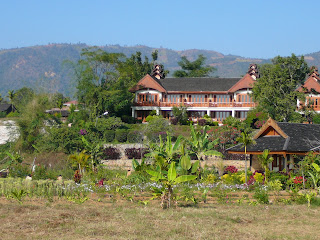Rosa,
our guide, tells us that the hotels around
Inle Lake have all gathered together and collected enough money to improve the
road themselves, but the regime will not let them. It is hard to think of any reason for this, other than the fact that the government does not want the people to meet more tourists or increase their income.
This leads to a discussion of the state of
tourism. In 1996 when Burma had only 100,000
tourists a year, the Generals decide to promote
Burmese tourism. Unfortunately for the people of
Burma, this had exactly the opposite effect as the rest of the world acted negatively to the Government’s promotion, and tourism dropped drastically. Since then it has been slowly recovering to the extent that
Burma received 300,000 tourists in 2006. This compares to 30,000,000 that visited
Thailand last year. But in 2007
Myanmar will have less than 100,000 tourists. In September and October, because of the uprising, they had almost no tourists. It is now December, their busiest month of the year and there are but a handful of tourists. She explains how this is a disaster for the poor people of Myanmar, many of whom earn their living by
selling souvenirs, driving cars, or working in the hotels and restaurants. The last two months have been a terrible hardship for them, and she thanks us sincerely for coming to her country.
Rosa is scathing in her condemnation of the current regime, telling us how all the money that is collected goes directly to them, and very little gets to the people. Schools are few and far between and only primary school is free. If parents do make the sacrifice to send their children on to secondary schools, there are no jobs for them when they get out. So, particularly in the countryside, children leave school and start work at an early age. Rosa herself went to University and got a degree in Chemistry only to discover that there are no jobs for Chemical Engineers in Myanmar . She is convinced that the government does not want to educate its citizens for fear of the consequences. Poor uneducated people are much easier to control.
She goes on to say that
Myanmar is a country
rich in natural resources. It has
oil,
diamonds, rubies, and minerals, but none of the technology to exploit them. Instead the government plunders everything, selling the rights mainly to China , India and Russia , and keeping all the proceeds to themselves. Nothing filters down to the people.
The Army has 400,000 soldiers but the country has no enemies. Rosa is convinced that the figure of 400,000 soldiers that the Government admits to is vastly underestimated. There is no mandatory service for the people. Instead they keep such a large force by paying them about double what any other entry level job in the government pays, and then they throw in free housing and health care.
Finally she tells us that the daughter of one of the ruling Generals got married earlier this year and the wedding cost $5,000,000, an unheard of amount of money to almost everyone in Myanmar, and an amount that would have done an enormous amount of good if it had been spent on the people.
It is an amazingly open discussion with a Myanmar national (she prefers to call it Myanmar ) who readily admits that she loves her country and is proud of her people, but hates her Government. We arrive at our hotel feeling older, wiser and sadder.





















